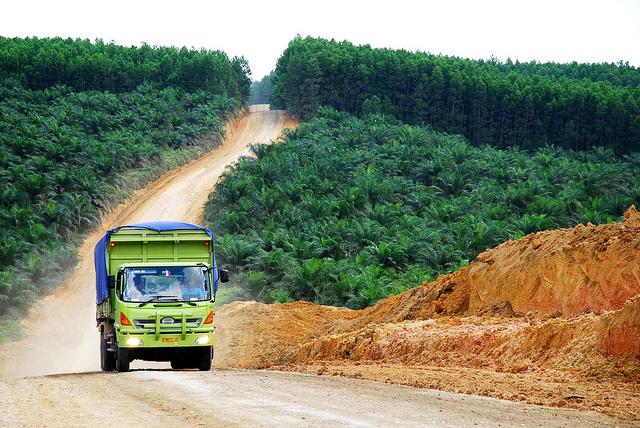
This research builds upon the work of the previous Flagship 5 Global governance, trade and investment (2011-2016), incorporating some elements of Flagship 2 Management and Conservation of Forest and Tree Resources.
Pressure on the land is increasing as the world population and economies keep growing. Farmers and food industry have to feed an increasing population; governments keep aiming to boost their economies to get more people out of poverty. Unsustainable logging in natural forests keeps expanding, and often logged-over forest is replaced with agricultural cash crops or tree plantations.
In response, several public and private policy initiatives have emerged such as private standard to promote sustainable production; corporate commitments to ‘zero deforestation’; some governments in consumer countries have introduced regulations to limit imports of unsustainable commodity supply. In addition, some financial service providers are adopting responsible lending practices. The effectiveness of these different responses, however, is still on question.

Flagship 3 embraces the challenge of researching and providing options on how global value chains and investments can be made more sustainable and inclusive, and leverage on the potential of finance for scaling up.
The value chain Flagship focuses on three areas of work:
- Public and private institutional arrangements that create an enabling environment for enhancing the sustainability of commodity supply;
- Business models that integrate smallholders to deliver positive impacts across social, economic and environmental dimensions;
- Responsible finance initiatives to bring appropriate business models to scale up and encourage corporate and smallholders, and small and medium scale enterprises (SMEs) uptake of improved sustainability practices.
Flagship 3 will identify knowledge gaps, distill best practices, produce methods and tools, convene stakeholder meetings, engage in business and multi-stakeholder platforms, and co-generate options of policies and practices to:
- Improve the sustainability of forests, agricultural and tree-crops production in forest landscapes by identifying complementarities between public regulations, and private standards and commitments;
- Inform businesses and service providers about business models that are more inclusive, gender-responsive, economically viable and environmentally sustainable;
- Increase of investments flows in forest and tree-crop sectors (e.g. oil palm, cocoa, coffee, rubber, coconut) by contributing to develop innovative finance mechanisms to support smallholders and SMEs.
Research under this theme will equip farmers, businesses and the public sector with knowledge on institutional arrangements and management systems to produce agricultural crops and manage forests in more integrated and sustainable ways—and in compliance with social and environmental standards.
Better knowledge is needed on how to build business options and fair partnerships that create opportunities for smallholder farmers who are increasingly involved in global value chains. This work also aims at safeguarding the rights of marginalized groups such as women and indigenous people.
Finally, we want to better understand and build bridges for linking responsible financial institutions and innovative financing mechanisms with smallholders and forest landscapes with potential to embrace more sustainable practices and inclusive business models under reduced financial and territorial risks, and greater social benefits for smallholders and SMEs accessing those resources.
The lessons from our previous work suggest that while the adoption of improved governance and business models is necessary to tackle negative environmental impacts, it may have contradictory social and economic effects, with winners and losers. Finance has the potential to trigger significant change at scale in the adoption of sustainability practices and business models, yet this is contingent upon the adoption of good practices. The latter, however, tends to work in contexts where more integrated value chains prevail and may have negative social effects on smallholders, especially of those who are resource poor.
Flagship 3 research works under the assumption that complementary public and private institutional arrangements, aligned with finance, may create the conditions for more and more farmers and businesses to adopt sustainable practices and help integrate smallholders and SMEs in global value chains.
The value chain theme is divided into three groups of activities:
1) Enabling sustainable commodity supply chains;
2) Business models in timber and tree-crop value chains;
3) Scaling through responsible finance and investments.
These three groups of activities have interconnected goals and approaches. The first one examines the policy and institutional environment shaping the structure and dynamics of timber and agricultural commodity value chains (oil palm, rubber, soybean and beef) that are articulated to global markets and contribute significantly to deforestation and forest degradation. The second focuses on business models in timber and tree-crop value chains (e.g. palm oil, cacao, coffee and coconut) that link corporations with smallholder farmers and SMEs. The third cluster assesses how the financial sector influences the social and environmental performance of value chains and businesses, and how innovative finance provides opportunities for smallholders and SMEs.
By 2022, Flagship 3 research aims to have contributed to the following targets:
- 25 million ha of forests will be under sustainable forest management, of which 2 million ha will be protected from deforestation;
- 5 million smallholders have been supported in adopting improved management practices, of which 3 million will be assisted to exit poverty.
